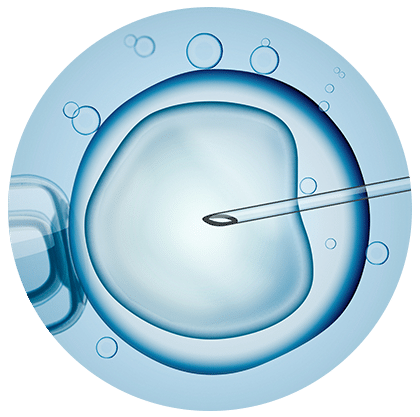When your heart is in a different place, we’re here to help.
For many women, the choice to have their tubes tied is carefully considered and improves the long-term quality of their lives. However, for those who change their mind and desire to once again have the opportunity for children, laparoscopic tubal reversal is the least invasive way to restore natural fertility.

About Laproscopic Tubal Reversal
According to a study published in the Journal of International Medical Research, laparoscopic tubal reversal (also known as tubal ligation reversal surgery) had fewer complications, a smaller scar, and an easier recovery period with less discomfort than all other types of reversal procedures. At South Jersey Fertility Center, we’re proud to be New Jersey’s only provider of this type of minimally invasive, tubal ligation reversal. We want to ensure that anyone expressing regret with their tubal sterilization gets the chance to explore their options with our experienced experts.
How it Works
The process of a tubal ligation reversal surgery will begin with a consultation with your physician so we can learn more about your health history and previous tubal ligation procedure. Candidates for tubal reversal are women under the age of 45 whose tubes have not been completely removed. Tubal ligations where tubes were closed with clips or rings, or those who have had the middle portion of their tubes burned or removed have the option of tubal reversal.
If you have a male partner, a semen analysis is recommended, though not required. It is also helpful to find the operative report (and if applicable, pathology report) from your tubal ligation surgery. Once you have met with your physician and feel confident that you are ready to proceed, our surgical scheduler will coordinate your tubal reversal.
Our tubal reversal experts use microsurgical techniques to remove the clips or rings used to block your fallopian tubes and then reconnect the fallopian tube segments to the uterus. Microsurgery procedures often have a reduced recovery time of 4-7 days off work, and most patients are able to return home on the same day, with complete healing of the fallopian tubes taking around three months. Tubal reversal patients can begin trying to conceive as early as one month after their procedure.

More About Tubal Reversal

Success
The success rate of tubal reversal depends on a variety of factors such as age, method of tubal ligation and overall health. In general, for women under 40 years old there is a 50% chance of conceiving a pregnancy within one year from your tubal reversal surgery. For women between 41-44 years old, there is an approximate 20% within one year of trying. At your initial consultation, we encourage you to share your operative and pathology reports from your tubal ligation surgery to help determine a more accurate likelihood for success.
Cost
Tubal reversals are often not covered by insurances after elective sterilization, which is why we offer affordable rates and minimally invasive techniques to avoid lengthy hospital stays or recovery times.
Contact us to learn more 


Alternative Options
While tubal reversal is a successful option for many, some may not be candidates or wish to explore a different path. In Vitro Fertilization (IVF) is another popular option for those who have had a tubal ligation and want to grow their family. Often more expensive and involved than tubal reversal, IVF can lead to quicker conception and allows you to maintain your contraception even after conception.
Learn more about IVF 
Make an Appointment
Select an appointment at your convenience through our patient portal.

